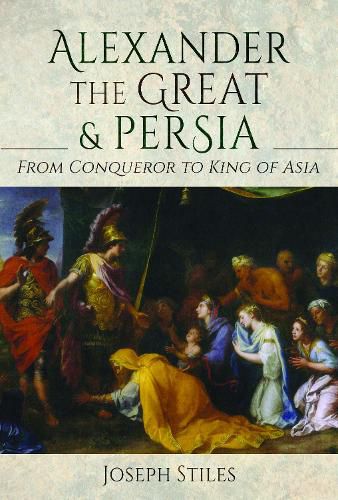Readings Newsletter
Become a Readings Member to make your shopping experience even easier.
Sign in or sign up for free!
You’re not far away from qualifying for FREE standard shipping within Australia
You’ve qualified for FREE standard shipping within Australia
The cart is loading…






Upon his return from India, Alexander the Great travelled to the Persian royal city of Pasargadae to pay homage at the tomb of King Cyrus, founder of the Achaemenid Persian Empire, whom he admired greatly. Disgusted to find Cyrus’ tomb desecrated and looted, the Macedonian king had the tomb guards tortured, the Persian provincial governor executed and the tomb refurbished. This episode involving Cyrus’ tomb serves as one of many case studies in Alexander’s relationship with Persia. At times Alexander would behave pragmatically, sparing his defeated enemies and adopting Persian customs. Sisygambis, the mother of Persian King Darius III, allegedly came to view Alexander as a son and starved herself at the news of his demise. On other occasions he did not shy away from destruction (famously torching the palace at Persepolis) and cruelty, earning himself the nickname ‘the accursed’. This conflicting nature gives Alexander a complex legacy in the Persian world. Joseph Stiles explores Alexander the Great’s fascinating relationship with his ‘spear-won’ empire, disentangling the motives and influences behind his policies and actions as ‘King of Asia’. AUTHOR: Joseph Stiles has a bachelor’s degree in History from Temple University and recently gained his master’s degree in World History from Norwich University, Vermont, USA, where his research centred on Alexander the Great and his policies in the East. He now works as a teacher and lives in suburban Philadelphia.
$9.00 standard shipping within Australia
FREE standard shipping within Australia for orders over $100.00
Express & International shipping calculated at checkout
Upon his return from India, Alexander the Great travelled to the Persian royal city of Pasargadae to pay homage at the tomb of King Cyrus, founder of the Achaemenid Persian Empire, whom he admired greatly. Disgusted to find Cyrus’ tomb desecrated and looted, the Macedonian king had the tomb guards tortured, the Persian provincial governor executed and the tomb refurbished. This episode involving Cyrus’ tomb serves as one of many case studies in Alexander’s relationship with Persia. At times Alexander would behave pragmatically, sparing his defeated enemies and adopting Persian customs. Sisygambis, the mother of Persian King Darius III, allegedly came to view Alexander as a son and starved herself at the news of his demise. On other occasions he did not shy away from destruction (famously torching the palace at Persepolis) and cruelty, earning himself the nickname ‘the accursed’. This conflicting nature gives Alexander a complex legacy in the Persian world. Joseph Stiles explores Alexander the Great’s fascinating relationship with his ‘spear-won’ empire, disentangling the motives and influences behind his policies and actions as ‘King of Asia’. AUTHOR: Joseph Stiles has a bachelor’s degree in History from Temple University and recently gained his master’s degree in World History from Norwich University, Vermont, USA, where his research centred on Alexander the Great and his policies in the East. He now works as a teacher and lives in suburban Philadelphia.